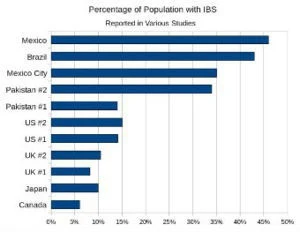Warm Moxibustion Found Most Effective for Irritable Bowel Syndrome (Study)
Irritable bowel syndrome (IBS) is a very commonly treated condition within Chinese Medicine. It along with a host of other digestive issues tend to respond quite well to acupuncture, herbal medicine, and as this study indicates techniques such as moxibustion.
 As IBS can be quite debilitating and it seems to affect 15% or more of the general population it is important to work towards resolving this condition in efficient and cost effective terms. While the underlying causes of IBS are poorly understood, there are some factors that likely contribute such as poor dietary choices, high stress levels, influences of medications and other drugs and more. Many people, however, make many positive changes in their diets and lifestyle and still have issues. To explain this, current research has indicated that IBS is at least contributed to by, if not outright caused by, a faulty communication between the brain and the gastrointestinal tract.
As IBS can be quite debilitating and it seems to affect 15% or more of the general population it is important to work towards resolving this condition in efficient and cost effective terms. While the underlying causes of IBS are poorly understood, there are some factors that likely contribute such as poor dietary choices, high stress levels, influences of medications and other drugs and more. Many people, however, make many positive changes in their diets and lifestyle and still have issues. To explain this, current research has indicated that IBS is at least contributed to by, if not outright caused by, a faulty communication between the brain and the gastrointestinal tract.
I have written previously about IBS and Chinese Medicine. One article explores Tong Xie Yao Fong Wan and its mechanisms for treating IBS and Crohn's. Another article, which is related to this current study, looked at some general mechanisms for how moxibustion helps IBS. (See "what is moxibustion?" if you are unfamiliar with the technique.)
As always, proper treatment in Chinese Medicine requires proper diagnosis (see "Treating the cause and not the symptoms"). For IBS there are a good number of potential diagnoses from a Chinese Medicine perspective. This is important to understand generally, but in this case it is important to understand the limits of studies like the one I'll be discussing today. In short, just because you have IBS doesn't mean that the basic techniques discussed in this article will be directly relevant to you. That said, the value of these studies to practitioners and our general understanding of how Chinese Medicine works is quite high.
In the study I'm discussing today researchers from the Shanghai Institute of Acupuncture-Moxibustion and Meridian publishing in the World Journal of Gastroenterology looked at the biochemical effects of two common stimulation techniques - electro-acupuncture (EA) and moxibustion. Their goal was both to understand the underlying mechanisms of how these techniques help IBS and to also see what worked best.
 In the study (using a rat model) researchers used the acupuncture point stomach 37 (ST 37), or "upper great hollow". ST 37 is commonly used for a range of more "excess" digestive conditions such as diarrhea, abdominal pain, bloating, constipation and more. A recent article "how ST 37 works for constipation" gets into some further details of how that point functions internally.
In the study (using a rat model) researchers used the acupuncture point stomach 37 (ST 37), or "upper great hollow". ST 37 is commonly used for a range of more "excess" digestive conditions such as diarrhea, abdominal pain, bloating, constipation and more. A recent article "how ST 37 works for constipation" gets into some further details of how that point functions internally.
They compared two types of stimulation to two different degrees - moxibustion at 43ºC vs. 46ºC and electro-acupuncture at 1mA vs. 3mA. Both moxibustion and electro-acupuncture are commonly used treatment mechanisms for a range of conditions. In clinical reality you'd often times be using both or at least regular body acupuncture with moxibustion, but these results may serve to simplify the range, duration and amount of clinical techniques applied.
Researchers looked at a range of changes from stimulating ST 37. These included the following:
- Mast cells (MC) activity - involved in the inflammatory response and are often elevated in patients with IBS, they modulate nerve activity in the colon. ( 1 )
- 5-hydroxytryptamine (5-HT) expression - better known as "serotonin" for which the colon is the largest producer - imbalances here are linked with many colon issues including IBS, cancer, diverticulitis and celiac disease, among others ( 2 )
- 5-hydroxytryptamine 3 receptor (5-HT3R) expression - when activated may lead to nausea, anxiety and other reactions via the central nervous system - as well as 5-HT4R expressions
The researchers found that while all techniques showed to direct the biochemical changes that aid in the reduction of IBS symptoms the warmest moxibustion at 46ºC (114ºF) was the most effective.
This is interesting to me because some consider EA to provide a stronger stimulation to certain acupuncture points. But here it was the warmth and the possible oil/chemical interactions with moxibustion that provided the best outcome. It may be that the warmth provided and the circulation that increases because of this literally forces the body to turn off the inflammatory markers so that it can respond properly. But these are questions that are not easy to answer, particularly when you are applying stimulation to acupuncture points that are nowhere near where the clinical problems exist. Regardless it may worth exploring both the actual temperature that moxibustion provides to see if warmer stimulation leads to better clinical outcomes as this study indicates.
tag @yinyanghouse for questions/comments